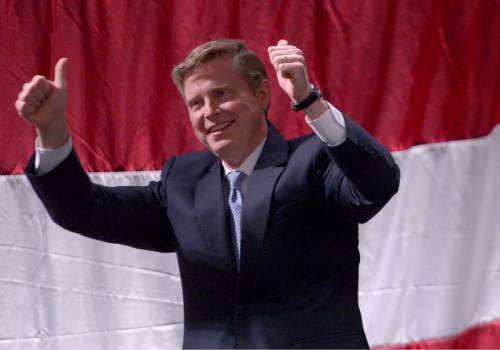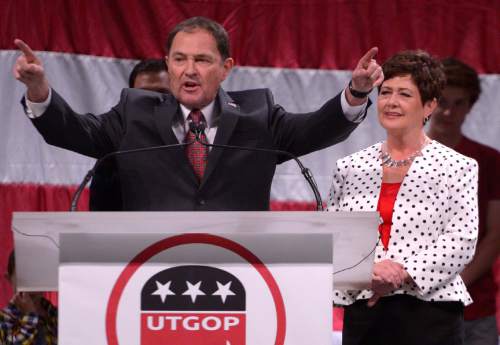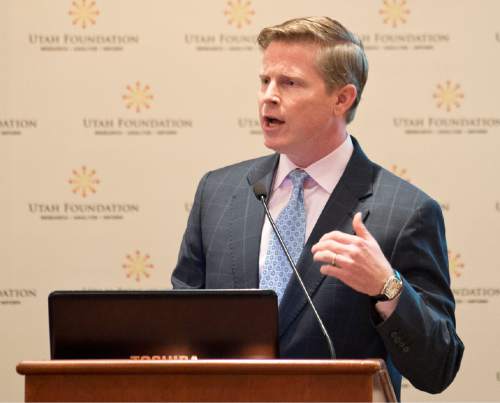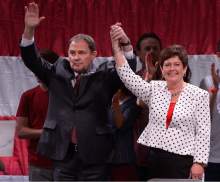This is an archived article that was published on sltrib.com in 2016, and information in the article may be outdated. It is provided only for personal research purposes and may not be reprinted.
Real estate developers, energy producers, health care companies and banking and finance interests have flooded Gov. Gary Herbert's campaign with more than $2.4 million since his last election, according to an analysis of the governor's campaign finance reports.
Those four sectors have made up more than half of the $4.4 million that Herbert has raised over the last 31/2 years, helping to build a massive fundraising advantage over his Republican opponent, Overstock Chairman Jonathan Johnson, as they head to next week's gubernatorial primary.
The Johnson campaign smacked Herbert for his fundraising, saying he is making good on a promise made in a secretly recorded meeting with lobbyists and supporters during which he branded himself "Available Jones" when it came to meeting with donors — a reference to a character in the Li'l Abner comic strip who would do anything for a buck.
"It is clear Available Jones has been making himself available — for a price — for quite some time and at an alarming rate. What results has he promised to each of these donors?" said Johnson's campaign manager, Dave Hansen.
The totals do not include money dumped into the race in recent weeks by the Utah Education Association, which has spent nearly $180,000 on mailers, television and online advertising in support of Herbert.
But the Herbert camp says it shows the governor had broad-based support in his re-election effort.
"Our economy is the best in the nation, businesses are creating jobs and people across our state recognize something special is happening in Utah," said campaign manager Marty Carpenter. "That success is reflected in the broad support Gov. Herbert receives from Utahns and Utah businesses who want him to continue to lead our state."
Rachel Sanders, executive director of the progressive-leaning Alliance For A Better Utah, questioned what the donors expect in return for their generosity. "What this shows is an obscene amount of money being collected from a small number of special interests," she said. "You can read the list and connect the dots to the legislation and policy at interest — real estate development, fossil fuels, payday lending and more. To suggest that they are not buying access and influence is simply absurd."
According to campaign finance reports filed Tuesday, Johnson has raised $1,481,039 between his campaign account and the Promote Liberty PAC, which Johnson runs, since 2015. Johnson had just under $93,000 left in the campaign account entering the last week of the primary.
Herbert's pre-primary report, filed late Tuesday, brought the governor's fundraising to $4.4 million — in both his campaign and his Governor's Leadership PAC — since the start of his current term in January 2013. The governor has just under $600,000 left in the bank.
The Herbert fundraising machine has been in high gear ever since he lost to Johnson by 10 points at the party's nominating convention in April, but it fared well enough — and gathered enough signatures on his candidate petition — to force a primary. At his meeting with lobbyists after the convention, Herbert's fundraising director said the campaign wanted to raise $1 million within a month.
The campaign may not have made the June 1 target, but it has raked in an impressive $1.3 million since the convention through a pair of golf fundraisers, a health care roundtable and fundraiser, a shooting event and an energy fundraiser that piggybacked on a state energy forum.
His largest fundraiser of the year, his annual fall gala, which regularly brings in somewhere in the neighborhood of $1 million, isn't being held until September, although many sponsors have already written their checks.
Hansen said the mad dash for cash proves Herbert is vulnerable in the primary and doesn't believe polls that have shown him well ahead — a 45-point lead in a Tribune poll and a 38-point lead in a poll conducted for UtahPolicy.com.
"Herbert knows what we have known all along: This race is much closer than his misleading polls state," Hansen said. "The fundraising of this election is a David and Goliath situation. Come next Tuesday, David will win again."
Johnson's fundraising has come almost exclusively from Overstock CEO Patrick Byrne, who has bankrolled his business partner to the tune of $850,000 so far; an additional $191,000 that Johnson and his wife have given or loaned to the campaign, and about $200,000 in donations and voter data given to the campaign by political consultant Chuck Warren and his firm, Silver Bullet. Those three sources have accounted for more than 80 percent of the money Johnson has raised and spent on his bid to oust Herbert — prompting the Herbert campaign to suggest Johnson would be Byrne's puppet if he is elected and the governor calling Byrne Johnson's "sugar daddy."
Herbert has the advantage of being the incumbent, which makes it easier to raise money from a variety of sources. But developers, bankers, energy companies and the medical industry have put together about 60 percent of his total contributions during his current term in office.
The Tribune categorized more than 700 donations of more than $1,000 received by the Herbert campaign since he won re-election in 2012. Those contributions make up nearly 95 percent of the money given to his political action committee and campaign account.
Commercial and residential developers gave $818,000 to Herbert over that period. Developer Kem Gardner led the way, giving a combined $100,000, William O. Perry & Associates, a commercial and residential real estate company, gave $95,000.
Energy companies charged up Herbert's campaign with $617,000 in donations, led by Deseret Power, which gave $107,500, followed by Questar at $60,000 and Rocky Mountain Power at $57,000. The governor also received $17,000 in contributions from Blue Castle Holdings, a company working to build a nuclear power plant in Emery County.
Banking and finance sector companies gave the Herbert campaign nearly $550,000, and health care and pharmaceutical companies contributed more than $450,000 with dietary supplement companies kicking in an additional $171,000.
Gail Miller — the state's wealthiest resident, according to Forbes, with a net worth of $1.6 billion — and her Larry H. Miller companies gave $105,000 to the governor's campaign, making her one of the governor's largest individual donors.
Huntsman International, owned by Jon Huntsman Sr., formerly the wealthiest Utahn, contributed $75,000.
Mail-in ballots went out earlier this month in 20 of Utah's 29 counties and voters will go to the polls on June 28. The winner of the primary will face Democrat Michael Weinholtz, who had not filed his financial report as of Tuesday evening.
Based on earlier reports, Weinholtz's fundraising had been lackluster, bringing in about $36,000 from supporters. But the candidate, who is a multimillionaire, made a $1 million loan in February to bankroll his campaign.
Twitter: @RobertGehrke









